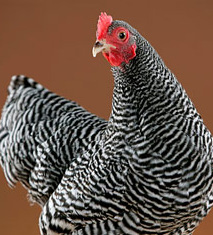Chicks and the City II
Shelly Stewart returned to the Mission Hills Garden Club for Chicks and the City II. The June meeting took place at the Mission Hills Nursery, home to two chickens, Maggie, a Rhode Island Red (brown eggs!) and Ash, a Barred Plymouth Rock. There was a third chicken, Willow, but Willow turned out to be a rooster and was banished to someone’s farm out in the country. While the city of San Diego does allow chickens within the city limits, San Diego discriminates against roosters.
Stewart began her presentation with the pros of raising chickens. Stewart enjoys hers as pets who “provide fresh, delicious eggs” for her table, giving her some control over her own food supply.
Chickens also provide bug and weed control. I read that some chickens are good mousers; they are omnivores. They swallow their prey whole. Hens require access to extra calcium to produce strong Egg on the left is freshly laid; egg on the right is store- bought eggshells. Setting out a bowl of oyster shells allows the hens to supplement calcium when their bodies need it. You can also save their own eggshells and feed them back to the hens. This is the “ultimate in recycling,” says Shelly. Do let eggshells dry before giving them to the hens so they don’t get a taste for eating their own eggs.
Stewart’s hens heighten her awareness of the natural environment, even in the city. Since they live in her front yard, they attract neighbors and encourage conversation, increasing her connection with her community. Hens provide “endless joy and comedy.” For instance, one of her hens was wont to perch outside the window to watch Stewart and her family eat breakfast. If the door failed to latch securely, that hen would be indoors in a heartbeat.
Stewart’s hens like doing everything together following a set schedule: at a certain time, they may all take dust baths. They lie down in a pile of dirt in a “sideways sprawl” looking as if they are dead, but they are just enjoying the sun. Then it may be yoga time when they strike “poses.” Their antics can be endlessly entertaining.
Although another benefit to owning chickens is the fertilizer they produce, it is one of its drawbacks too. An improperly maintained coop or a noisy hen could lead to neighbors’ animosity. Stewart has been blessed with supportive neighbors. Nevertheless, “in the absence of a rooster, a hen at the top of the pecking order may decide to suddenly start crowing like a boy.” You can discourage this behavior by communicating to the flock that you are the top cluck or “head rooster.” In addition to crowing, some hens like to let the neighborhood in on their activities. A hen may loudly proclaim that she has “’laid an egg.’”
Being close to nature, chickens are susceptible to parasites, viruses, and predators. After they invaded her home as well as the chickens’ quarters, Stewart found she had inadvertently purchased mites with her bedding hay. The mites were not easily exiled, and Shelly spent months working on eradicating them.
Chickens, like most prey, attempt to hide problems and illness from predators. Symptoms like weight loss, pale waddles and comb, and dull feathers may be an indication of a much bigger problem which may not be apparent until a hen is to too sick for a cure. Veterinarian visits can be costly for an entire flock of hens; prevention is the key to maintaining an affordable, healthy flock.
Failing to keep your chickens happy and entertained in an enclosure can lead to boredom. Boredom (and overcrowding) can lead to their pecking each other bald or even to death. Providing entertainment like, digging for a tasty chicken treat known as “scratch” keeps them happy and busy. However, a down side is that “scratch” and chicken feed can attract rodents. One of our members admitted to having had an army of rats invade a tree where her chickens roosted.
Chickens can and will tear up the garden if allowed, especially when the plants are new. Stewart’s garden has an eight foot fence to keep chickens away. Once plants are well established, Stewart allows them limited access to help control weeds and bugs. Expect some damage while they help. Chickens also have a “Houdini syndrome.” They can and do escape.
“You don’t save money on eggs,” Stewart told us. Each breed is known for the quantity of eggs laid. Even if you purchase an excellent laying breed, a hen’s output depends on many things. She won’t reach puberty until she is four to eight months old. While you wait for eggs, you are still feeding and caring for her until she is mature enough to lay eggs. When winter comes, her egg production may slow or stop. Egg laying is dependent on the number of daylight hours. Peak production comes when the hen is about one to two years old; her life span is eight to ten years, if she survives illnesses, predators, and injury. Stewart says, “Raising hens in the city is a meaningful and fulfilling endeavor that I recommend for many reasons, but it is not for everyone. With this presentation, I aim to provide an honest (and comical) overview of the pros and cons so people know what to expect, and so they can decide if it really is the right activity for them and their family.” Although I was at the original Chicks and the City, this presentation helped me see my husband’s point of view. “No damn chickens!” says he. I’d still like to have some.
For a video of Stewart’s set up, go to www. youtube.com/watch?v=oo0m-_jmZ-Q.
Join us August 22 for Dave Yetz’s talk about Rare Fruit Growers. Meetings are at 4070 Jackdaw, between Fort Stockton and West Lewis from 6:00 to 8:00 p.m. Members are free; guests pay $10, but this will be credited to the $35.00 membership fee if you join the club that evening.
Category: Life Style









